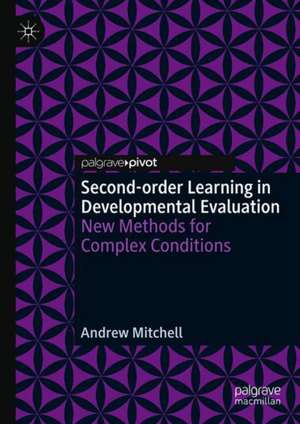Second-order Learning in Developmental Evaluation: New Methods for Complex Conditions
Autor Andrew Mitchellen Limba Engleză Hardback – oct 2018
| Toate formatele și edițiile | Preț | Express |
|---|---|---|
| Paperback (1) | 350.35 lei 38-44 zile | |
| Springer – 27 dec 2018 | 350.35 lei 38-44 zile | |
| Hardback (1) | 385.08 lei 6-8 săpt. | |
| Springer International Publishing – oct 2018 | 385.08 lei 6-8 săpt. |
Preț: 385.08 lei
Nou
Puncte Express: 578
Preț estimativ în valută:
73.69€ • 80.02$ • 61.90£
73.69€ • 80.02$ • 61.90£
Carte tipărită la comandă
Livrare economică 22 aprilie-06 mai
Preluare comenzi: 021 569.72.76
Specificații
ISBN-13: 9783319993706
ISBN-10: 3319993704
Pagini: 148
Ilustrații: XI, 146 p. 2 illus.
Dimensiuni: 148 x 210 mm
Greutate: 0.35 kg
Ediția:1st ed. 2019
Editura: Springer International Publishing
Colecția Palgrave Pivot
Locul publicării:Cham, Switzerland
ISBN-10: 3319993704
Pagini: 148
Ilustrații: XI, 146 p. 2 illus.
Dimensiuni: 148 x 210 mm
Greutate: 0.35 kg
Ediția:1st ed. 2019
Editura: Springer International Publishing
Colecția Palgrave Pivot
Locul publicării:Cham, Switzerland
Cuprins
Introduction.- Evaluating complexity.- Second-order learning systems.- Community-based sustainability initiatives as learning systems.- Concluding remarks.
Notă biografică
Andrew Mitchell is a Research Fellow at De Montfort University in Leicester, UK. His background is in community based projects, working with complex and wicked problems. He undertakes qualitative research in project-based learning as well as socio-economic evaluations of project impacts.
Textul de pe ultima copertă
This book aims to account for how project learning and adaptation occurs through Developmental Evaluation (DE), especially under conditions of uncertainty, complexity and change. Drawing on enactive cognitive science, the author presents a DE framework designed to augment traditional monitoring and evaluation activities. Discussing this framework in detail, the author also reports upon an extended case project investigating the sustainability of a market town in the UK. The framework aims to support the reader in capturing second-order learning and exploring opportunities for innovative responses to dynamic, uncertain and complex operational conditions. Recommendations are offered for future research, and how the framework might be incorporated into the design and funding of projects deployed to work with wicked problems.
Caracteristici
Provides a Developmental Education framework which augments traditional monitoring and evaluation Details a case study investigating the sustainability of a town in the UK Investigates how project learning and adaptation occur via Developmental Education Provides guidance for policy responses to wicked problems and accompanying funding recommendations
